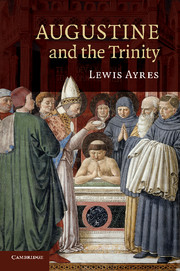Book contents
- Frontmatter
- Contents
- Acknowledgements
- List of abbreviations
- Introduction
- Part I Origins
- Part II Ascent
- Part III Into the mystery
- Part IV Memory, intellect and will
- 11 ‘But it's not fur eatin’ …'
- 12 ‘… It's just fur lookin’ through'
- Epilogue: Catching all three
- Bibliography
- Scripture index
- General index
- References
12 - ‘… It's just fur lookin’ through'
Published online by Cambridge University Press: 06 December 2010
- Frontmatter
- Contents
- Acknowledgements
- List of abbreviations
- Introduction
- Part I Origins
- Part II Ascent
- Part III Into the mystery
- Part IV Memory, intellect and will
- 11 ‘But it's not fur eatin’ …'
- 12 ‘… It's just fur lookin’ through'
- Epilogue: Catching all three
- Bibliography
- Scripture index
- General index
- References
Summary
in the De trinitate as in the Contra Academicos, the slowness and the detours in the argumentation are intentional: it is a dialectical exercise which has the aim of training, of exercising the intelligence to raise itself towards that which is highest, to make us ascend, as Augustine loves to repeat, ab inferioribus ad superiora, to make us enter ab exteriroribus ad interiora.
SETTING UP DE TRINITATE 10: SE NOSSE – SE COGITARE
In the first sentence of Book 10, Augustine describes his task as one of approaching that which he seeks to explain with a more thorough or precise attention.2 Treatments of the relationship between the two books have frequently focused on the relative adequacy of the two triads of mens, notitia, amor and memoria, intellegentia, voluntas. I suspect, however, that the things Augustine seeks to explain more thoroughly are not primarily the terms of these triads, but the complexities of arguing that the mind knows itself in all acts of knowing and seeking, even in those that constitute an on-going process of increasing forgetfulness of self amid the created order. Only if we can understand this dynamic more clearly, Augustine is arguing, will we be able to understand how the mind knows in the presence of, informed by the Word and how it is that the mind forgets this presence and may return to it.
- Type
- Chapter
- Information
- Augustine and the Trinity , pp. 297 - 318Publisher: Cambridge University PressPrint publication year: 2010



